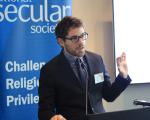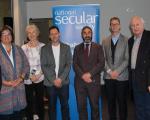Religious Surgery and Children’s Rights
Female genital mutilation (FGM)
Female genital mutilation (FGM) has been illegal in the UK since 1985 and the law was updated in 2003. Despite this, some British girls of Muslim parents are still being sent back to the countries of their parents' origin for this abusive procedure to be done. And, many believe it is even performed secretly in this country. We therefore question why there has not been a single successful prosecution since the practise became illegal. We are concerned that fear of upsetting cultural and religious sensitivities prevents such abuse and bodily harm from being tackled effectively.
Circumcision
All children deserve equal protection under the law, regardless of their gender, and the UK is obliged to ensure non-discriminatory application of its law under Article 14 of the European Convention on Human Rights.Given that female infants are protected from all forms of genital cutting in the Female Genital Mutilation Act 2003, there can be little argument that the same protection ought to be extended to male children.
The principle behind FGM ban was the protection of girls from any form of genital cutting, no matter how slight or what the cultural background of the parent. There is no legitimate basis for denying such protection to boys.
Circumcision is far from risk-free and affects a significant minority of infants. Scarring, infections, pain on urinating and psychosexual difficulties are not uncommon results of ritual childhood circumcision. In one hospital alone in 2011, 11 baby boys needed to be admitted to the hospital's paediatric intensive care unit with serious, life-threatening complications following circumcision. In February 2012, a baby boy died in North London as a direct result of bleeding complications two days after a ritual circumcision.
A statement of the Royal Dutch Medical Association produced along with seven other Dutch scientific associations including the GPs, paediatric surgeons, paediatricians and urologists concluded that the procedure can be harmful and that it violates the boy's human rights to autonomy and physical integrity.
This position was mirrored by the recent German court ruling which found that non-therapeutic circumcision of male children amounts to bodily injury, and is therefore a criminal offence.
We welcome the development that the lawfulness of child circumcision is being increasingly questioned and that medical opinion in a number of countries is similarly turning against the historic carte blanche afforded to infant circumcision on the basis that the parents' freedom of religion is the only consideration. Instead, it is now being recognised more widely that this non-therapeutic procedure for which there are numerous complications, some of which are very serious, is a breach of children's rights.
We reject the claim that a parent's right to religious freedom, entitles them to decide for themselves whether they wish to have this intervention carried out. Denying parents any entitlement to make such a decision does not constitute any limitation of the parents' right to manifest their religion; the child has rights too, not only to religious freedom, but also to the right to physical integrity. This invasive surgery is non-consensual, non-therapeutic, irreversible, unnecessary and not without risk. We argue that It should be postponed until the boy is old enough to give (or withhold) informed consent.
Find out more
 | Ep 05: Dr Antony Lempert | Exploring religious freedomPosted: Tue, 12 Mar 2019 14:55 Continuing our series of discussions exploring religious freedom, Alastair Lichten spoke with Dr Antony Lempert. Dr Lempert is chair of the Secular Medical forum, a regular speaker and expert on freedom of and from religion in healthcare. Watch this episode on YouTube | Transcript This was part of a series of interviews leading up to our major conference Secularism 2019: Reclaiming Religious Freedom. Information on all the speakers and a videos from all the talks are now available. Links from Dr Lempert: |
 | NSS calls on NSPCC to reconsider its position on genital cuttingPosted: Thu, 7 Mar 2019 14:59 The National Secular Society has called on the National Society for the Prevention of Cruelty to Children to reconsider its position on non-therapeutic male circumcision after it defended the practice. NSS chief executive Stephen Evans wrote to the NSPCC after it deflected a question about the similarities between infant male and female genital cutting on Twitter last week. In response to a query asking why its website only covered female genital mutilation, the NSPCC tweeted: "FGM is illegal and a form of child abuse. "The evidence on MGM isn't strong enough to suggest that male circumcision should be considered a form of child abuse, when considering the physical, religious and social implications. "We understand that some parents see circumcision as being in the best interests of the child and it's vital that it's carried out by expert practitioners and that any risk and suffering for the child is minimised." In his letter Mr Evans said the NSPCC's position was "difficult to reconcile with a consistent approach to other forms of non-therapeutic body alteration on children". "Arguments similar to those made to justify the imposition of non-therapeutic male circumcision are also made to justify other non-therapeutic surgery of children. But UK courts have not accepted that religious/cultural reasons justify any form of assault on children in other contexts." He added that non-consensual circumcision undermined children's right to religious freedom by irrevocably depriving them of the chance to dissociate from practices or customs with which they disagreed. "Freedom of religion and belief belongs to the individual person; otherwise it is not freedom. The surgical assignation of a child's genitals with the religious beliefs of his parents stands in stark contrast to this freedom by making assumptions about the child's later beliefs and then making irreversible changes to the most intimate part of his body before his beliefs could possibly be known." He said individuals' right to express and practice religion were "subject to the rights and freedoms of others" under Article 9 of the European Convention on Human Rights. And he noted the growing recognition that non-therapeutic circumcision was a violation of children's right to bodily integrity. In recent years the Council of Europe, the Nordic children's ombudsmen and the Child Rights International Network have been among those to condemn the practice. Medical ethicist Dr Brian Earp, who will address the subject of children's bodily integrity at the NSS's Secularism 2019 conference, was among those to criticise the NSPCC's position on Twitter. He said the NSPCC's view was "uninformed", asked whether the organisation was "regurgitating popular clichés" and pointed out that the overlap between male and female cutting is well established. Explaining his decision to write the letter, Mr Evans said: "The NSPCC has a tremendous track record of protecting children, but appears to have a blind spot when it comes to the ritual cutting of boys' genitals. "With a growing global consensus that forced genital cutting is harmful and represents a fundamental violation of the child's right to physical integrity and autonomy, the time has come for child protection agencies to review their stance. All children should deserve the same level of protection, irrespective of their religious or cultural background. "Religious privilege and cultural sensitivity should play no part in the formulation of policy when it comes to protecting vulnerable children from harm and abuse." Last year a poll found that 62% of people in Britain would support a law to ban the cutting of children's genitals for non-medical reasons. The poll results emerged as Icelandic lawmakers considered introducing a similar measure. |
 | The BMA’s genital cutting guidance is a disturbing departure from evidence-based, patient-centred policy makingPosted: Wed, 27 Feb 2019 11:22 The body which represents doctors has missed the opportunity to take a stand against medically unnecessary child circumcision in its new guidance on the subject, says Dr Antony Lempert. Infant male circumcision is increasingly under the spotlight, largely due to a growing international community of medics, lawyers and human rights advocates promoting child safeguarding in the face of threats from traditional religious or cultural practices. Where the practice is 'justified' it is usually done so on the grounds of religion or culture. Amid the increasing opposition to the medically unnecessary cutting of children's genitals, the BMA's medical ethics and human rights department has recently published revised guidance for doctors. As a document to guide doctors I have serious concerns that this guidance will instead cause confusion for doctors and may cause harm to patients. The guidance is a disturbing departure from evidence-based, patient-centred policy formation. It contains misleading quotations and logical inconsistencies and focuses primarily on a 'best interests' consideration that is almost exclusively reliant on parental beliefs rather than established norms of good medical practice since the area of contention is that of healthy pre-consenting children born into cutting cultures. Doctors seeking to use the guidance risk being confused by these competing demands. It is particularly disappointing that the guidance explicitly avoids the ethics of non-therapeutic male circumcision (NTMC). A large number of seemingly ethical principles are mentioned in a section of the guidance on "determining best interests". But confusingly, these are then circumvented by associated caveats largely reliant on both parents' religious or cultural beliefs. Without a detailed consideration of the ethical position, this toolkit fails to address many concerning aspects of existing practice. The new guidance represents a lost opportunity to remind doctors that the cutting of any child's healthy genitals for no medical reason is not in a child's "best interests". As a professional body with a remit "to influence the advancement of health and the profession", the BMA has abdicated its responsibilities towards the thousands of vulnerable children it says are likely having their genitals cut every year for no medical reason. Despite helpful individual references to many of the guiding principles at play, to the legal precedent and international human rights norms, this document as a whole is a muddled smokescreen for the status quo. Doctors who already have a full understanding of their professional responsibilities in general are likely to be confused as to which parts of the contradictory information in this guidance might be most useful to guide them when faced with a request by parents to cut a healthy (male) child's genitals for no medical reason. Parts of this guidance are welcome though ultimately confusing. The guidance states that the evidence concerning health benefit for NTMC is insufficient for this alone to be a justification for the procedure; this understates the fact that there is a large body of evidence showing rather more harm than benefit. The statement is particularly perplexing since circumcision is by definition a therapeutic procedure when it is performed on health grounds. It is difficult to understand why the BMA, whilst disclaiming specialist medical expertise, nevertheless considers it appropriate to comment on the health benefits of a procedure performed for no medical reason. On therapeutic circumcision, this updated guidance repeats the excellent advice contained in guidance the BMA published in 2006 entitled 'The Law and Ethics of Male Circumcision'. That document said "unnecessarily invasive procedures should not be used where alternative and less invasive techniques are equally effective and available". It is perverse, therefore, that where the procedure is not even therapeutically required, this guidance, by active omission, recommends a removal of this protective precautionary advice from the children who would ordinarily require even more protection because there is nothing wrong with them. It is also particularly disappointing that the BMA now waters down the previous advice contained in the 2006 guidance that it would be unethical to circumcise a child solely for therapeutic reasons where medical research has shown other techniques to be at least as effective and less invasive. The 2019 guidance now includes a caveat relating to a consideration of "relevant social and cultural interests". Whilst the guidance claims not to offer an opinion on NTMC, there is a clear steer, as above, towards consideration of parents' strong beliefs as a factor to permit doctors to become involved in the forced cutting of (male) children's healthy genitals. What is not clear is why the BMA steers in this direction. This is particularly inconsistent with recent legal judgements which the guidance quotes. It notes a ruling that NTMC constitutes "significant harm" under the terms of the Children Act. It says that "in the recent cases... of a dispute over whether NTMC was in the best interests of a child lacking competence, the courts have ruled that NTMC was not in the child's best interests". It says children's best interests would best be served by waiting for them to make up their own mind. It is axiomatic within medical practice that people themselves should be empowered to make as many decisions for themselves as they can and every possible effort should be made to enable them to do so. Despite the growing worldwide consensus that cutting any child's genitals for no medical reason represents a fundamental violation of the child's right to physical integrity and autonomy, the BMA remains on the fence. This is particularly disappointing as every opportunity for the representative body to hear the debate and form an opinion has been thwarted over the past nine years. Even so, the guidance makes some further notable omissions and is highly misleading. Of particular concern, some of the information is presented in such a way as to distort and misrepresent the facts. For example, the UN convention on the rights of the child (UNCRC) is correctly cited as recommending that states take "all effective and appropriate measures with a view to abolishing traditional practices prejudicial to the health of children". The guidance follows this with a comment about a law passed in Germany, making reference to Germany's ratification of the UNCRC. The new German law now permits NTMC in children under 6 months old. Three particular omissions in this section are striking. Firstly, the standalone German law was introduced in direct response and opposition to a 2012 Cologne court case in which a doctor was ruled to have been in breach of German law when he performed NTMC on a 4-year-old boy. In other words, for NTMC of some male children now to be 'legal' in Germany existing law had to be circumvented, not overturned. Secondly, in 2013 the UN Committee on the Rights of the Child itself placed NTMC in the category of violence against children in its final comments on Israel's compliance with the UNCRC. (Israel, like all UN member states except the US, has ratified the UNCRC). Thirdly, in 2013, all the children's ombudsmen from the five Scandinavian nations issued a joint statement that NTMC violates fundamental medical ethical principles and that boys should be allowed to decide for themselves by waiting until they are old enough to do so. The guidance states that the BMA does not take a position on ritual non-therapeutic male circumcision, is not a clinical organisation and would welcome a comprehensive review of the literature. Yet at the same time, the guidance contains assertions and conclusions that belie the stated reticence to provide them, some of which are mentioned above. The guidance baldly repeats the 2006 guidance that "circumcision does not need to be performed by a doctor". There is no evidence to back up this wholly counter-intuitive assertion that male children of parents who feel very strongly that their children's genitals should be cut for ritual or traditional purposes are to be singled out as the only people who do not require a sterile, hygienic environment when they are to be subjected to surgery. This is particularly troubling considering that the surgery is not medically necessary and does not have the consent of the person on whom it is to be performed – both features that would ordinarily mean additional precautions rather than fewer. More troubling still is that unnecessary surgery of this nature, on a vulnerable person such as a child, would ordinarily trigger major safeguarding concerns rather than a shrug of the shoulders that "the prevalence of NTMC in the UK is unknown." This would be particularly true if the surgery was performed by people without medical training and with no audit or follow up. Though the BMA states it is not providing ethical advice on NTMC, a section of the new guidance states: "The BMA cannot envisage a situation in which it is ethically acceptable to circumcise a child or young person who refuses the procedure, irrespective of the parents' wishes". That is welcome. There is no ethical coherence in stating this whilst simultaneously urging doctors to consider strong parental or community beliefs as a reason to cut the healthy genitals of the cohort of younger children who have not yet attained the capacity to understand let alone resist. Yet this is precisely what this guidance does recommend. The guidance also correctly cautions doctors about the damage that might be done to the individual's relationship with his parents and the medical profession. But simultaneously, doctors may well be led to understand by this guidance that the parents' beliefs and culture might satisfy reasonable requirements for irreversible forced genital cutting of (male) children. It is difficult to understand the BMA's logic. It has produced a guidance document on NTMC which is like a jigsaw puzzle of a roadmap, but cobbled together with selected pieces from different puzzles, and with major A roads missing. |
 | Doctors’ body: consider parents’ religion on infant genital cuttingPosted: Wed, 27 Feb 2019 09:08 The National Secular Society has criticised the professional body which represents doctors after it said "health interests" should not be the sole factor in deciding whether to cut boys' genitals. In newly-published guidance for doctors the British Medical Association (BMA) has said decisions on whether to circumcise boys should partly be influenced by their "social and cultural interests". It adds that "an overall best interests assessment" should include consideration of "matters including the child's social and cultural circumstances". "Where a child is living in a culture in which circumcision is perceived to be required for all males, the increased acceptance into a family or society that circumcision can confer is considered to be a strong social or cultural benefit. Exclusion may cause harm by, for example, complicating the individual's search for identity and sense of belonging." The guidance says "parental preference alone does not constitute sufficient grounds for performing NTMC (non-therapeutic male circumcision)". But it also lists a series of factors to be taken into consideration on the subject. They include "the views of parents and family", "the implications for the family of performing, and not performing, the procedure" and "relevant information about the child or young person's religious or cultural background". It adds that "some religions require circumcision to be undertaken within a certain time limit", meaning a decision not to cut their genitals immediately may be "harmful". The BMA says it has "never taken a position in the debate about the acceptability or otherwise of NTMC". "Instead, as with other procedures involving children who lack the capacity to consent, we have made clear that those wishing to authorise the procedure for their children need to demonstrate that it is in the child's best interests." It also cites several positions outlined by the General Medical Council (GMC), which registers medical practitioners. One cited GMC document says doctors should "consider the religious and cultural beliefs and values of the child or young person and their parents" when deciding whether to cut children's genitals. The BMA guidance says doctors are not obliged to carry out requests to circumcise children if they do not think it is in their best interests. But it adds that doctors who object to cutting children's genitals must follow GMC guidance on conscientious objection. It also says doctors who do not believe circumcision is in a child's best interests should tell parents that they are entitled to seek a "second opinion". The BMA also refers to GMC guidance on personal beliefs. This says doctors carrying out ritual circumcisions should "explain" to patients or their parents that they may invite a "religious adviser" to attend "to give advice on how it should be performed to meet the requirements of their faith". The BMA acknowledges that harm can be done when someone does not have "the opportunity to choose not to be circumcised or choose not to follow the traditions of his parents". It says this, along with the potential harm caused to the child's relationship with his parents as a result, should be taken into account. It says doctors should not assume that parents will support circumcision or seek it because a child is "born into a practising community". It adds that "options which maximise the child or young person's future opportunities and choices" should be prioritised over those which do not. The BMA's positions on medical ethics often have a significant influence on government policy. NSS chief executive Stephen Evans said: "We welcome the BMA's acknowledgement that parental preference alone does not constitute sufficient grounds for performing ritual circumcision. However, we reject the tacit assumption within the guidance that because a child is born to parents with strong religious beliefs, it may be in the child's best interests to be subjected to medically unnecessary surgery. "There is ample evidence of harm from ritual circumcision. Child safeguarding must be the priority rather than appeasing the desire of adults within a community to express their belief through the forced cutting of their child's genitals. Religious freedom isn't a licence to violate children's rights. "The BMA's vague advice also fails doctors, who would benefit from clear directions which put their duty of professional care to their patients first. "No child should be subjected to unnecessary medical surgery. We therefore urge policymakers to promote child safeguarding in the face of harmful religious or cultural practices." The guidance acknowledges that there is a growing medical consensus against non-therapeutic genital cutting. In 2010 the Royal Dutch Medical Society (KNMG) advised doctors to discourage parents from having their sons circumcised, urging "a strong policy of deterrence". It said any medical advantages of circumcision were significantly outnumbered by the risks and other disadvantages, such as the loss of up to 30% of erogenous tissue. In 2013 an international group of physicians criticised the American Academy of Paediatrics for promoting infant male circumcision. The Council of Europe adopted a non-binding resolution advising member states not to allow the ritual circumcision of children unconditionally, at least for very young children. The Scandinavian children's ombudsmen issued a joint statement saying children should be allowed to choose for themselves. In 2016 the Danish Medical Association said circumcision should only be performed with "informed consent". And in 2017 a Belgian federal government committee ruled against the cutting of infant boys' genitals for reasons other than medical necessity. Children's right to physical integrity and protection from physical injury is protected by the International Treaty on the Rights of the Child. In a submission to a GMC consultation on its guidance on decision making and consent last month the NSS said it should "explicitly address" the harm caused by ritual infant genital cutting. The guidance comes as the government is expected to bring a bill to strengthen protections against female genital mutilation (FGM) before the House of Commons. A private members' bill on FGM was blocked from immediate passage by the Conservative MP Christopher Chope earlier this month. In a debate on the topic shortly afterwards Conservative MP Andrew Bridgen asked minister Lucy Frazer to "update the house on the government's policy on male genital mutilation". Frazer's reply did not address the topic of cutting boys' genitals. Bridgen's colleague Matthew Offord later remarked that there was "no moral equivalence" between cutting boys' and girls' genitals. |
 | NSS: doctors shouldn’t collude in unnecessary child genital cuttingPosted: Fri, 25 Jan 2019 09:50 The National Secular Society has called on the body which registers doctors to "explicitly address" the harm caused by ritual infant genital cutting in guidance on decision making and consent. Draft guidance from the General Medical Council (GMC) has endorsed the general principle of patient autonomy, including over patients' "future choices". It also says doctors should be aware of patients' vulnerabilities. In a submission to a consultation on the guidance the NSS's Secular Medical Forum (SMF) welcomed the GMC's commitment to these principles. But the SMF questioned their compatibility with the council's position on circumcision. Previously-issued GMC guidance has said doctors must consider "the child's and/or the parents' cultural, religious or other beliefs and values" when assessing whether circumcision is in a child's best interests. The GMC's new guidance says: "Doctors have an ethical and legal responsibility to involve patients as much as possible in making decisions about their own health and care." It also says doctors should act in a way which is "least restrictive of the patient's rights and freedoms including their future choices". And it adds that doctors should be aware when "patients may be particularly vulnerable". But it does not mention ritual genital cutting. SMF chair Dr Antony Lempert said: "Standalone, the draft GMC guidance is comprehensive and excellent. But it is discordant with existing GMC guidance which allows for parental beliefs to be a proxy consent for non-medically necessary surgery on children's genitals." The SMF's submission said the guidance "sets out excellent guiding principles for use by doctors when making decisions with patients". But it said the GMC should "explicitly" address child genital cutting so it "no longer allows parental beliefs, however strongly held, to be a determining factor in nonessential surgery on babies and children". "We urge the GMC to reconsider the guidance in these other areas to remove the inconsistencies and ensure that all GMC guidance is concordant and maintains as the first concern of every doctor the care of the patient, and not the patient's parents or community. "It is not sufficient to assert that certain religions or cultures require a certain practice. In most circumstances it is self-evident that the most vulnerable patients of all, i.e. small children and babies who cannot consent and who cannot defend themselves, are granted even greater protection than adults. "Yet, in this one area, GMC guidance leads one inexorably to the conclusion that the GMC considers it acceptable to rely on parental beliefs as a proxy for a child's future beliefs. "If ritual male circumcision is to be allowed by society, there is no reason for doctors to be involved. In fact, by following this excellent draft guidance, there is every reason for doctors to challenge societal acceptance of this practice by highlighting the many dangers rather than colluding with it." The SMF also warned of the risk that vulnerable patients could be "put under pressure either by their family or community or by their doctor to choose a specific treatment". It said guidance on children whose parents wish to refuse blood transfusions on their behalf, for example, should make explicit that parental consent "is valid only as exercised in the best interest of the child". This would be in line with the Children Act of 1989, which makes clear that "the child's welfare" should be a court's "paramount consideration" in determining questions around children's upbringing. The SMF also warned of the risk that vulnerable adults "may find it very difficult to seek independent medical advice and support" to understand the implications of choices they make under community pressure. And the SMF's response recommended a specific reference to the importance of doctors distinguishing between "sincerely held personal, including religious, beliefs and their professional opinion". |
 | Medical ethicist Brian Earp to speak at Secularism 2019Posted: Wed, 16 Jan 2019 13:41 The National Secular Society is pleased to announce that cross-disciplinary medical ethicist Dr Brian D. Earp will address its Secularism 2019 conference on 'reclaiming religious freedom'. Dr Earp, a research fellow at the University of Oxford and Yale University, will address children's right to bodily autonomy. He spoke about infant genital cutting at the NSS's Healthcare and Secularism conference in October, when he argued that all children should be entitled to autonomy over their genitals regardless of their sex. He also warned of an "imminent collision course" in law and policy regarding different ethical standards for female, male and intersex forms of genital cutting. Dr Earp's interests include psychology, the philosophy of science and bioethics. NSS chief executive Stephen Evans said Dr Earp would make an "excellent" addition to the line-up of speakers. "Brian Earp's superb talk at our Healthcare and Secularism conference last year made a compelling case that all children should be given the chance to control their own bodies. "Children's freedom to accept or reject religion when they are ready to do so is too often overlooked in debates over genital cutting. We're looking forward to hearing Brian develop his thoughts on this subject as an issue of both medical ethics and religious freedom." Secularism 2019 will explore religious freedom as a right that belongs to everyone and which has limits when it impinges on human rights such as bodily autonomy and freedom of expression. The other confirmed speakers include Sara Khan, the government's lead commissioner for countering extremism, and Dr Ahmed Shaheed, the UN special rapporteur on freedom of religion or belief. The keynote address at the conference will be delivered by Rachel Laser, the CEO of the US-based campaign group Americans United for Separation of Church and State. |
 | Ritual genital cutting kills boy in ItalyPosted: Thu, 3 Jan 2019 10:50 A two-year-old boy has died and his twin brother has been hospitalised after their genitals were cut for religious reasons at a migrant centre in Italy. The boys were circumcised at the request of their mother, who wanted to mark Nigeria's Islamic traditions, according to local media reports. An American man of Libyan origin has been charged with murder. National Secular Society chief executive Stephen Evans said the death was "a reminder of the risks and harm associated with the ritual circumcision of baby boys". The NSS campaigns for an end to non-consensual, non-therapeutic circumcision. In recent years several other babies' deaths from circumcision have come to public attention. In 2010 a boy in Manchester died from circumcision wounds at the age of four weeks. A nurse was found guilty of manslaughter by gross negligence and given a suspended prison sentence. In 2012 a boy from north London bled to death as a result of circumcision, as did a baby in the Canadian province of Ontario in 2013. In 2009, 105 boys were treated at A&E at one hospital in Birmingham for complications after circumcisions. One per month had life-threatening injuries. Traditional genital cutting ceremonies in sub-Saharan Africa are thought to have claimed hundreds of lives and hospitalised hundreds of thousands between 2008 and 2014 alone. There is increasing medical scrutiny of the practice of male circumcision. In 2017 a Belgian federal government committee ruled against the circumcision of infant boys for reasons other than medical necessity. In 2010 the Royal Dutch Medical Society (KNMG) advised doctors to discourage parents from having their sons circumcised, urging "a strong policy of deterrence". KNMG said any medical advantages of circumcision were significantly outnumbered by the risks and other disadvantages, such as the loss of up to 30% of erogenous tissue. And in 2016 the Danish Medical Association said circumcision should only be performed with "informed consent". Studies have shown that male circumcision causes excruciating pain for the boys involved. The procedure also causes bleeding and infections. Its long-term health complications can include scarring, denuding of the skin of the penis, urinary difficulties, erection problems and psychological problems. In 2018 lawmakers in both Denmark and Iceland considered bills to outlaw the cutting of healthy children's genitals, but faced strong opposition from religious groups. Forced genital cutting has also been criticised on children's rights grounds. Last year the Child Rights International Network (CRIN), an international advocacy organisation, said the practice "goes against medical ethics". CRIN called the ritual circumcision of infant males for non-medical reasons a "violation of bodily integrity" which "unnecessarily" exposes children to risks. The local mayor in the Italian case, Antonino Lupi of the town of Monterondo, described the death as "an absurd tragedy". Some local groups have claimed the death illustrates the need for public institutions to offer genital cutting services to parents in Italy. |
 | Genital cutting and the laws of unintended consequencesPosted: Thu, 22 Nov 2018 17:00 This week's developments on ritual genital cutting in the US and Denmark highlight the need to adopt a consistent application of human rights principles for everybody, regardless of gender, argues Dr Antony Lempert. International legal conventions and agreements have drawn increasing consensus worldwide on what constitutes safer and more equal societies: societies in which legislation does not intrinsically favour men or women, boys or girls; in which children's rights are recognised and respected; and in which adults are allowed to make their own autonomous decisions. This week, two events in different parts of the world have put this received wisdom to the test. Specifically, these two events have combined to open a window onto the inconsistencies in current thinking about ritual genital cutting worldwide, about gender discrimination and about the primacy of autonomy of the individual over their own body. In Denmark this week there was a blow to proposed gender-neutral legislation seeking to offer legal protection to boys, girls and intersex children at risk from medically unnecessary genital surgery. The proposed bill would allow adults the right to choose cosmetic genital surgery for themselves once they were 18. Campaigners from Intact Denmark are still hopeful of rallying enough support to pass the bill. But some Danish politicians are evidently fearful that respect for autonomy might permit some (female) adults to choose to undergo what most people would regard as a mutilating procedure. They are worried about the unintended consequence of legalising 'female circumcision', more commonly known as female genital mutilation (FGM). Meanwhile in a court case in the USA, the 1996 anti-FGM federal legislation was rejected by a judge in the state of Michigan on the grounds that the legislation itself was unconstitutional. The apparently perverse outcome of this was that the case against two medical practitioners alleged to have performed FGM on nine girls was thrown out of court, causing widespread dismay. Currently, most forced genital cutting legislation world-wide (passed in 30 nations to date) focuses only on FGM or forced genital cutting of females (FGC/F - UN nomenclature); this is the case in the UK, in Denmark and the USA. With gender-neutral wording, the proposed Danish legislation seeks to be consistent with Article 24(1) of the International Covenant on Civil and Political Rights (ICCPR): Every child shall have, without any discrimination as to race, colour, sex, language, religion, national or social origin, property or birth, the right to such measures of protection as are required by his status as a minor, on the part of his family, society and the state. The proposed Danish bill recognises the increasing evidence that boys and intersex children also suffer harm and some die from surgery to their genitals that they did not choose and from which they were too young to protect themselves. In other words it is not only girls who are at risk from the wide variety of genital cutting of children. In the UK in 2016, the then president of the family division of the High Court of England and Wales, Sir James Munby, commented along similar lines, saying some forms of FGM are less invasive than what is commonly known as male circumcision, describing all under the umbrella of 'significant harm' as defined by the Children Act (1989). The 2003 Danish penal code currently prohibits women, even as adults, from choosing FGM surgery. This is analogous to the UK 2003 FGM legislation which also prohibits any form of FGM, consensual or otherwise, on (female) children or adults. Nevertheless, some operations which do involve the cutting of the adult female genitalia with consent and for no therapeutic reason are still permitted. For example, labiaplasty – surgery to reduce the size of the labia – is permitted the UK. This is consistent with autonomy and with other forms of cosmetic surgery but would appear to conflict with anti-FGM legislation. The Michigan judge who threw out the FGM case stated that: "Congress overstepped its bounds by legislating to prohibit FGM... FGM is a 'local criminal activity' which, in keeping with long-standing tradition and our federal system of government, is for the states to regulate, not Congress." As such this judgement does not now legalise FGM in the USA; it was just not felt to be the correct legal tool for the job. Notably, though, in rejecting the 1996 anti-FGM legislation, the judge also quoted from Article 24(1) of the ICCPR. He did so to demonstrate the inconsistency of attempts to claim that the FGM legislation was consistent with the ICCPR by preventing discrimination when in fact it is a wholly discriminatory female-only piece of legislation. The US case, then ongoing, was discussed in some detail at the National Secular Society's recent Healthcare and Secularism conference by the medical ethicist Brian Earp. Brian superbly highlighted in his talk how "the distinction between males and females in the law was facing a collision course." So, on the one hand, the unintended consequence of protecting all children from forced genital cutting and allowing adults autonomy is that some adult women might choose a dangerous procedure for themselves. If they reject this legislation, Danish politicians will allow male children and intersex children to be forcibly cut without legal protection. On the other hand, the unintended consequence of a female-only law in the USA is that it clearly fails the test of gender discrimination and has allowed FGM practitioners to walk free. There is a solution to this confusing muddle; but many find it unpalatable because it involves the recognition that ritual male circumcision, even when done by Jews and by Muslims, and even when done in sterile environments to minimise the harms, is intrinsically a violation of a child's basic human rights to choose for themselves what is right for their own body. If children's rights are to be protected then international covenants such as the ICCPR should be used as they were intended to ensure that all children have equal rights and equal protections. By extension this protects the adults they will become. Equally, if there is consensus that people should be protected from themselves from making really harmful decisions such as cosmetic genital surgery then there is every reason to ensure that laws are gender-neutral. There is nothing wrong with the Danish bill, it just seems that way to some politicians because of current distorted thinking around genital cutting. This week has highlighted more than ever the need for all forms of genital cutting to be considered in the round and the need to adopt a consistent application of human rights principles for everybody, regardless of gender. Please note: This blog was updated on Friday 23 November to reflect the fact that campaigners remain hopeful of passing the legislation in Denmark. |
 | How secularism protects people who have religious faithPosted: Wed, 14 Nov 2018 17:31 For Interfaith Week 2018, campaigns officer Megan Manson explains how the National Secular Society's work protects those who are religious as well as those who are not. One of the most common misconceptions about the National Secular Society is that we are an atheist campaigning group. For much of our 150-year history this was indeed the case, but the modern day NSS has changed its focus so it is entirely focused on state neutrality on religion. Today we work towards building a more equal, inclusive and just society based on secularism and on the application of universal human rights. Our members come from across the political spectrum and religious spectrum. What's more, the NSS actually spends considerable time and resources upholding the human rights of people within faith communities, and working together with members of those communities to fight injustices. Many of the issues we campaign on are niche areas affecting religious minorities, which have little or no direct impact on people who aren't affiliated with the religion. We care about these issues because secularism is for everyone, regardless of their beliefs or faith background. When people come to us for help (which they do daily), we don't ask them about their religious beliefs. We're just interested in protecting the human rights that we all share. It's important to respect that those we defend often retain their faith long after losing trust in the religious institutions that have wronged them. But where human rights are being breached, both those of faith and of no faith are equally entitled to secular justice. In light of Interfaith Week, here's a look of some of the work we've been doing this year to defend the human rights of people in Christian, Muslim, Jewish, Hindu and other faith communities. Cracking down on 'conversion therapy' So-called 'conversion therapy' is the pseudoscientific method of trying to turn LGBT+ people heterosexual. Individuals who seek conversion therapy are usually religious. That's because their religious community has taught them that attractions towards people of the same sex are sinful. It becomes a deep source of shame and stigma within their community. The organisations that offer the 'therapy' are also religious. They prey upon the desperation of individuals who believe that they are suffering an 'affliction', and that this affliction damages their relationship with their community and their God. The 'therapists' can charge a considerable fee for this service. Conversion therapy doesn't work. Instead, it frequently causes psychological (and sometimes physical) harm to the individual. It is also inherently homophobic, treating same-sex attraction as a disorder rather than the natural preference of the individual. That's why the NSS has been campaigning against conversion therapy for many years. After we wrote to professional psychological groups asking that they tell their members not to endorse the practice, all major counselling and psychotherapy bodies condemned conversion therapy by signing a Memorandum of Understanding in 2015. This year perhaps saw the biggest victory yet: a government announcement that it would work to end the practice of 'conversion therapy' in the UK. At our recent Healthcare & Secularism Conference we were delighted to offer a survivor of conversion therapy who is also a member of the general synod of the Church of England a platform to speak about her experiences from a faith perspective. Jayne Ozanne spoke passionately about her journey of self-acceptance, remarking somewhat tongue in cheek, that she seemed had more friends in secularist circles that at the synod. Ending caste-based discrimination Another issue that is little-known outside specific faith contexts is that of caste-based discrimination. Found predominantly in Hindu communities, caste systems in the UK have led to discrimination, harassment and bullying in employment, education and in the provision of services. Equality law exists to protect people from unfair treatment because of certain personal characteristics, such as race or religion. Despite this, there is nothing specific in the Equality Act to deal with caste-based discrimination, even though perceived caste is a characteristic that a person cannot choose. So the NSS has been working together with anti-caste campaigners both to raise awareness of the issue, and to call for legislation to protect people from discrimination. We criticised the government's decision in July not to incorporate caste into equality law along with the Equality and Human Rights Commission. We will continue to campaign for this unjustifiable form of discrimination to be recognised and outlawed. Exposing the harm of religious 'courts' Secularism means there should be one law for all – the laws of the land should treat everyone equally, regardless of religious or cultural background. That's why we're concerned with the proliferation of religious tribunals that actively undermine the justice system, as well as the rights of people 'subject' to them. A particular concern are 'sharia councils', because there is an evident lack of awareness in some communities that they have no legal authority whatsoever. Muslim women who have migrated to the UK with low English proficiency are especially at risk, because sharia councils can be discriminatory towards women and leave them vulnerable to abusive relationships. We've been working with equalities campaigners, many of them themselves Muslim women, to prevent sharia councils from undermining human rights and British law. This year we co-signed an open letter co-ordinated by Southall Black Sisters to the Ministry of Justice calling for government advice for women to seek out religious 'courts' and to guarantee access to justice for all. Free expression for all, including people of faith Freedom of expression is a fundamental human right that should never be restricted by religious concerns. This is why we campaign so vigorously to abolish blasphemy laws. As recent events have shown, the victims of blasphemy laws are frequently members of a religion themselves. In October the plight of Asia Bibi brought Pakistan's draconian blasphemy laws to the world's attention. A group of Muslim women refused to share a bowl of water with Bibi because she is a Christian. Bibi challenged them, and following an argument the Muslim women reported Bibi to the local cleric for allegedly insulting Muhammad. A Pakistani court convicted Bibi of blasphemy and sentenced her to death. The NSS joined other human rights campaigners in defending Bibi, by writing to the Foreign Office and urging it to put pressure on Pakistan to release her. Since then, Pakistan's Supreme Court has ordered Bibi to be freed. Bibi and those who defended her in Pakistan are still in danger, but the court's reversal of her prosecution is a step in the right direction. Defending survivors of clerical abuse The campaigns described so far primarily affect adults. But some of our most critical work is standing up for the rights of the most vulnerable people of all in faith communities: infants and children. And it is children who are usually the victims of clerical abuse. Secrecy, close ties with the establishment, a sense of entitlement and ready access to large groups of young and vulnerable people mean that religious organisations are easy targets for sexual predators. When abuse does occur, the victims can find it extremely hard to get justice; not least because they are usually children. Even in adulthood, survivors of clerical abuse find that powerful religious institutions are well-positioned to cover up their crimes and bully victims into silence. And they are highly motivated to do so in order to protect their reputation. The NSS has long worked with survivors of clerical abuse, particularly within the Catholic Church and the Church of England. We've assisted the United Nations in its investigations into countries with significant clerical abuse problems. In his capacity as a lawyer representing survivors Richard Scorer, who is also our vice-president, has pushed for a law requiring mandatory reporting at the Independent Inquiry into Child Sexual Abuse. And we were proud to give the 2018 Secularist of the Year award to Phil Johnson and Rev. Graham Sawyer, who have campaigned on behalf of victims of abuse which took place within the Church of England. Bodily autonomy for all children Clerical sexual abuse of children is illegal and universally condemned. But children within religious communities can be harmed in other ways that are not against the law, and that may even be condoned by the state and by large proportions of society. One such form of harm is male circumcision. In the UK, the practice of non-therapeutic genital cutting in children is almost exclusively found in religious communities. There are no laws protecting boys from this excruciating and permanent form of body modification. Meanwhile, although all forms of genital cutting in girls (FGM) are against the law, there have been no successful convictions for FGM in the UK. We believe that all children, regardless of gender or religious background, should be entitled to make their own decisions about their bodies. No-one, baby, child or adult, should be subject to non-therapeutic genital cutting without their express consent. That's why we work alongside those raised in Jewish and Muslim communities in campaigning to end religious genital cutting of children, and to raise awareness of this topic which is often poorly understood by those outside the 'cutting communities'. We've been particularly vocal on the issue this year, with NSS representatives appearing on national TV and radio to make the case for children's bodily autonomy. Proper schooling for children raised in faith communities We believe that faith should never be a barrier to children's education. While the NSS is perhaps better known for our No More Faith Schools campaign, we also speak out for the rights of children who are being educated within faith schools. This year, we exposed the distorted relationships and sex education (RSE) that thousands of children are receiving in faith schools across England. We found that RSE lessons in faith schools were teaching that same-sex relationships, contraception and sex outside of religious marriage are wrong. We campaign for all children, regardless of their faith background, to have the right to inclusive and objective RSE, and we have shared our findings and our concerns with the government. Our campaigns for children's right to a worthwhile education goes beyond the state sector. We've been at the forefront on the crackdown on unregistered, illegal faith schools. Such schools not only fail to provide children with a broad and balanced education; they also fail to safeguard the pupils and may even leave them vulnerable to radicalisation. We've provided evidence to the government to help tackle unregistered schools, including recommending reforms to elective home education which can sometimes be used as a cover for illegal schooling. Secularism recognises all individuals as human beings with equal rights and dignity. That's why we'll continue to campaign for everyone, no matter what their faith or background, has access to secular justice, secular healthcare, and secular education. |
 | Individual rights and autonomy key themes at NSS healthcare eventPosted: Thu, 1 Nov 2018 14:31 Speakers have called for individual rights and bodily autonomy to take priority over religious concerns in healthcare policy at a major National Secular Society conference on the issue. The one-day Healthcare & Secularism Conference, which took place on Saturday at the Radisson Blu Hotel in Birmingham, gave participants the opportunity to discuss secularism's role in healthcare and medicine. Academics and experts in medicine, law and ethics addressed the conference, which tackled issues including conscientious objection, 'gay conversion therapy', ritual genital cutting, sexual health rights and assisted dying. Dr Antony Lempert, chair of the Secular Medical Forum and one of the event's chief organisers, opened the conference by saying secularism empowers informed patients to make decisions that are right for them. He added that the "harmful imposition" of other people's beliefs in healthcare is causing "far too many" people to suffer. Michael Thomson, a professor of health law, spoke about reclaiming conscience in healthcare. He said the narrative on religious freedom has been oversimplified, especially in the field of medicine. Michael talked about the development of abortion law in particular. He said it was "quite wrong" for any doctor to put personal views before the care of a patient, and personal objections should be "overruled by professional obligation". He warned that a bill on conscientious objection tabled in January would expand the scope of practices that clinicians can refuse to provide, reducing patients' access to certain treatments. Jayne Ozanne, a member of the Church of England's general synod who works with religious organisations around the world to eliminate discrimination based on sexuality or gender, spoke about 'gay conversion therapy' (GCT). Jayne, a gay Evangelical, referred to her own experiences of GCT and the subsequent campaigning she has done to end the practice. Jayne said many religious people may undergo GCT because they believe being LGBT is sinful and individuals who come out as LGBT in religious communities put themselves in a position of "great vulnerability". She added that GCT does not just involve psychological abuse but can include physical and sexual violence. Studies have found that GCT can result in self-harm, suicide attempts and problems with relationships and sexual functioning, and is ineffective in changing same-sex attraction. The conference also focused on the issue of religiously-motivated genital cutting of children, beginning with a talk on male circumcision and the law with James Chegwidden, an Old Square Chambers barrister. He said infant ritual circumcision remains an "anomaly" with no legal justification in any field of law, even though society no longer tends to regard children as the property of their parents. James argued that non-consensual circumcision violates article nine of the European Convention on Human Rights, which protects the right to freedom of thought, conscience and religion. He said "imposing one's religion on another is precisely what the article is designed to prevent". Brian Earp, a cross-disciplinary research fellow at Yale and Oxford, warned of an "imminent collision course" in law and policy regarding different ethical standards for female, male and intersex forms of genital cutting. He said proponents of male infant circumcision have found support among those promoting female genital mutilation (FGM). All forms of FGM are banned under UK and US laws but male circumcision is not, despite the fact relatively 'minor' forms of FGM are less invasive than male circumcision. Brian argued that biological sex should not determine the level of protection children have to intact genitalia and that all children should be entitled to genital autonomy. Ann Furedi, chief executive of the British Pregnancy Advisory Service, spoke on standing up to opponents of abortion. She said it was wrong to criminalise women for seeking abortions or doctors for performing them, adding that recent changes to abortion law have been "phenomenal". She encouraged advocates of choice to embrace free speech to persuade the public of their position. She argued that abortion clinic 'buffer zones' are justified because they prevent anti-abortionists stopping women from accessing abortion services. But she added that it is worth engaging with protestors outside these zones, because "the best way we can stand up to our opponents is to engage them and defeat them in argument". The final two talks examined assisted dying. Dr Jacky Davis of Healthcare Professionals for Assisted Dying (HPAD) told the audience that 100m people now have access to assisted dying and asked why people in the UK do not. She advocated the "Oregon law", which allows terminally ill people of sound mind and fixed purpose to receive lethal medication, as a good model for assisted dying in the UK. Jacky said those opposing assisted dying are often influential leaders of various religious groups, but their views often don't match many of those they claim to represent. She said a group called the Christian Medical Fellowship has been particularly influential in persuading the British Medical Association (BMA) to resist the legalisation of assisted dying. HPAD has called for BMA members to be surveyed on their views on assisted dying. The final speaker, NSS honorary associate and former chairman of the Voluntary Euthanasia Society Dr Michael Irwin, agreed with many of Jacky's points but offered alternative approaches. He said there would be a better chance of changing the law surrounding assisted dying if we were not limited to the Oregon model and the right to die were extended to others, such as those with serious degenerative diseases. Michael argued that assisted dying is simply another way of saying "good palliative care" and is not an alternative to palliative care as opponents often argue. The speakers also responded to audience questions after their talks. After the event Dr Lempert thanked those who attended and described the quality of the speakers as "outstanding". "Coming from different disciplines, backgrounds and beliefs, all speakers shared a common understanding of the central importance of caring properly for patients and for allowing patients to make their own decisions in healthcare. The theme of autonomy – a patient's right to choose for themselves what happens to their own body – ran through each of the talks. "In an environment of shared values, this conference explored some of the major difficulties faced by some people when other people's beliefs, values and treatments are imposed on them in a variety of ways from birth through to death. "The shared understanding of autonomy helps to show the way towards a truly secular healthcare system which would protect all patients by championing their rights to be fully informed of the available treatment options and to choose the one that's right for them." Discuss this story on Facebook Photo © Stephen Knight. |

